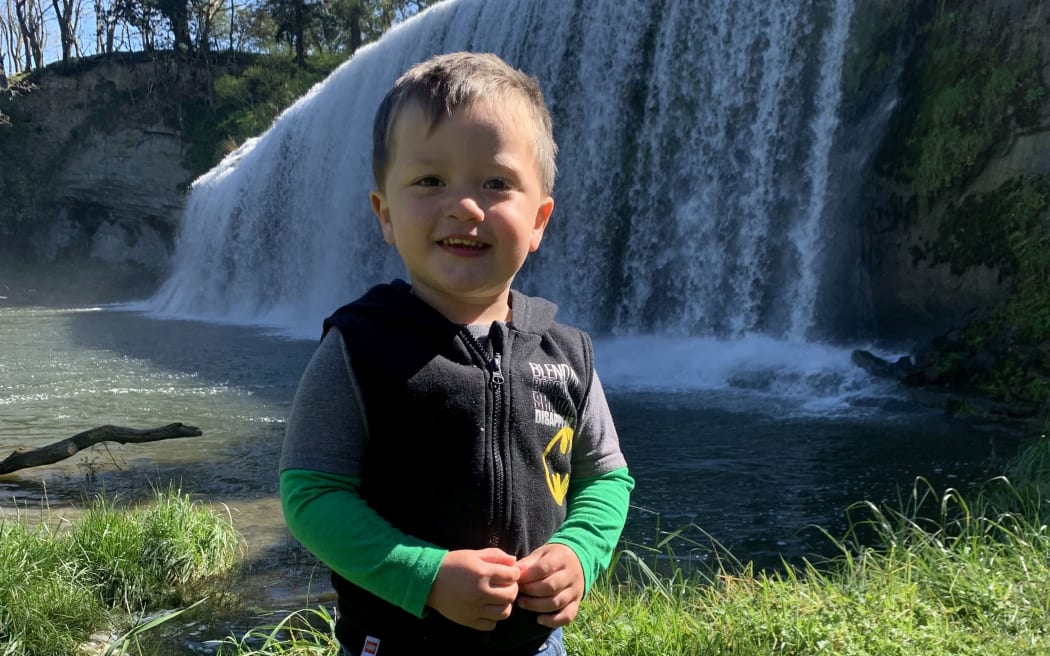
Beaudeen Ansell's child, Ezra. Photo: Supplied
Health professionals and families want action to prevent and test for the leading infectious cause of birth defects and permanent childhood disabilities - a virus that most of us get, but only one in 10 people have heard about.
Beaudeen Ansell from Tairāwhiti was pregnant with her third child Ezra and living in Perth when she was diagnosed with Cytomegalovirus or CMV.
She learned about the potential devastating effects of it on her unborn child through "Dr Google" - hearing loss, vision loss, small head size, lack of coordination, developmental delay and death, among many others.
Congenital CMV can cause more longterm disabilities than Down Syndrome, spina bifida and fetal alcohol syndrome.
So why does it fly under the radar?
"I guess because the outcomes can vary so much - personally, it seems like it's not been a priority," Ansell said.
"It can lead to serious complications such as stillborn and things like cerebral palsy, epilepsy. Recent studies also show that there was a link to autism and ADHD. You can have children born asymptomatic, no medical problems for the child. So it's kind of a guessing game.
"My GP in Australia said it's like a Lotto scratchie. You don't know what you're going to get until until your child is born.
"And because the symptoms for a pregnant mother are just like a normal flu or mild flu, for the majority you don't know that there's an issue until the time the child is born."
No absolutes
There are no absolutes with CMV: Mothers may have no symptoms, mild symptoms, bad symptoms; they may get tested in pregnancy.
It is likely a CMV-infected child will have no symptoms at birth - only about one in 10 do - but another tenth will develop problems that are not spotted till later on, some times years later. Sometimes a newborn hearing screen will raise a flag.
Work on a vaccine continues and there is no cure. And that is why prevention is the watch-word.
Specific advice needs to get out to parents on the dangers of infections from older children, especially those at daycare or pre-schools, Ansell said.
Yet it is paradoxically another reason that has been suggested why doctors may hesitate to talk about CMV: That the most obvious way to avoid the virus is to avoid infected toddlers.
While CMV does also strike first-borns, it is twice as likely to affect subsequent children.
Why the low profile?
Hearing House clinical director Holly Teagle sees many affected children and has set up a CMV clinic.
She ran through the guidelines for prevention: "Washing hands, being very aware of sharing utensils or kissing on the mouth with your other children".
"You know mothers learn about all the things they shouldn't do or should do during pregnancy and maybe there's not the same emphasis on some of the sort of hygiene things that a Mum can do just to protect that baby."
She offered a suggestion on why CMV has a low profile.
"People know a lot about Down syndrome and spina bifida. And other viruses that cause illness in babies when mothers are pregnant.
"But CMV I think, partly because there hasn't been some good treatments, it hasn't been discussed as openly and there does seem to be just kind of a general lack of awareness about it."
That lack of treatment options may also affect people's opinions of whether to screen for it at birth, "if we can't treat it, then there's no reason to screen for it", Teagle said.
But antivirals could limit CMV's effects, she said - albeit with complexities of their own - and screening was taking place in a growing number of other countries.
"I think it's better to know than not know, if your baby has a medical condition. And even if there may not be a proactive treatment to resolve the condition it's good to know, to be prepared and understand what complications or what problems you might anticipate."
The Hearing House in Auckland has about 20 referrals a year of children with congenital CMV, who may go on to have cochlear implants for profound hearing loss.
That was in addition to those affected elsewhere in the country, children with a milder hearing loss or those who were undiagnosed.
In addition to hearing loss, CMV can also result in developmental delays, cognitive impairment, movement and balance difficulties, visual difficulties and neurocognitive disorders, such as autism and sensory integration problems.
Paediatrician Emma Best, a specialist in infectious diseases at the University of Auckland, said despite all that, it was not a well-known virus.
"I think that CMV Cytomegalovirus is a pretty unfamiliar terms for most people, despite the fact it's an incredibly common virus and by the end of our lifespan, almost all of us have been exposed to it and had this infection."
It was important to look at what was happening internationally about screening and considering a more regimented process, she said.
Very sick babies would be tested at birth, and some after failing a newborn hearing test, Best said.
Research in May's British Medical Journal concluded all newborns who failed newborn hearing screening should be tested for CMV to ensure they get anti-viral treatment where appropriate, and to flag future issues with hearing or development.
What Te Whatu Ora says
Te Whatu Ora said in a statement it did not have any written material on CMV that it provided as advice to would-be parents, but lead maternity advisors could help if pregnant women had been exposed to the virus.
The most recent Newborn Hearing Screening and Early Intervention Programme Advisory Group meeting discussed CMV, and agreed emerging evidence and research on its impacts needed to be monitored.
"Te Whatu Ora is aware of Cytomegalovirus (CMV) and its potential impact on babies. With parental consent some clinicians do request CMV testing, using blood spot cards, post diagnosis of a hearing loss.
"Te Whatu Ora has not considered the addition of CMV to the Newborn Metabolic Screening Programme.
"For any condition to be added to the panel screened for by the Newborn Metabolic Screening Programme a formal application needs to be submitted. Once an application is received it is considered by the National Metabolic Screening Programme Technical Working Group and the National Screening Advisory Committee (NSAC).
"Both groups contain technical and clinical experts as well as Māori health and consumer representation."
Support group aims to spread word
More information on CMV can be found here.
A new trans-Tasman CMV Association, which Ansell was helping to coordinate, also offered support and information to Australians and New Zealanders, including te reo resources to raise awareness and spread the word.
Her family of five were back living in rural Tai Rāwhiti, and Ezra, now aged 4, so far had no symptoms; a family friend had cerebral palsy, hearing loss and epilepsy caused by CMV.
Despite how common the virus was, Ansell said awareness was low even among some doctors and midwives.
"What I found when I moved home, before we got the all-clear for his hearing and vision, is I really struggled to get in front of a paediatrician, even though I had a lot of paperwork and all those referrals and all his tests from Australia, because the GPs and midwives that I had here in our community weren't aware of CMV - there wasn't much information, they'd never come across a child with CMV.
"When I asked for referrals, I was met with 'he's just a child and he'll grow out of that'. So I had I really had to fight to to have my voice heard and my opinions acknowledged."
Ezra will see specialists and have hearing checks until he is 10.
"There's still so many question marks, there's still so much research to be done on the long-term for congenital CMV children. Every day is a new day and we take one day at a time."


